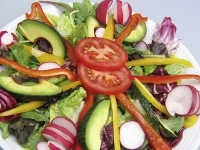How Healthy Is Your Salad? (and other hidden food dangers)
In our fast paced world we often struggle to find a balance in our diet between convenience and health. We all know the dangers of the fast food industry, high levels of salt and fat in many restaurant foods, of portion sizes being too large (particularly here in America), but we rarely question the "healthy" options we are choosing. I have many patients, for example, who eat energy bars as snacks. They are touted and marketed as "healthy" but many contain enormous amounts of calories and fat - enough to replace a meal or two in any given day. On top of three meals these types of snacks can easily lead to weight gain and related health problems.
As many of my patients are aware, I often discourage people from eating salads (see my "eat like a human" article), but that is not the purpose of this article. No, this article is about bringing more awareness into our food choices so we are not surprised when we do not get the expected results in weight loss, lowering cholesterol, etc.
 A recent study conducted by Which? magazine and reported by the British Broadcasting Company (BBC), looked at the nutritional content of various prepackaged salads and found some surprising nutritional information. Researchers found that many of the salad options contained more calories and fat than a hamburger and fries from a fast food restaurant. This study serves to illustrate that as consumers we need to be more aware of the nutritional content of our foods. An understanding of this allows us to better examine our choices and not be swayed by convenience and our gut understandings of what we feel is healthy.
A recent study conducted by Which? magazine and reported by the British Broadcasting Company (BBC), looked at the nutritional content of various prepackaged salads and found some surprising nutritional information. Researchers found that many of the salad options contained more calories and fat than a hamburger and fries from a fast food restaurant. This study serves to illustrate that as consumers we need to be more aware of the nutritional content of our foods. An understanding of this allows us to better examine our choices and not be swayed by convenience and our gut understandings of what we feel is healthy.
One of the salads, a tuna layered salad, (sounds healthy right?), contained 550 calories and over 40 grams of fat. From local market sources, a Whole Foods Chicken Ceasar salad contains only 330 calories but 810 milligrams of sodium. The same salad from the cheesecake factory contained 976 calories, and 100 grams of fat. The fat in that salad alone is 30 grams more than the daily allowance for women (70g) and over the daily allowance for men (100g).
So what to do? Well for one, making your own food is always better. You have better control over the ingredients, the portion size, and what other foods are combined in with the salad. Dressing is a popular way to improve the health of the salad - choosing olive oil over a ranch dressing for example brings you valuable help from its high monounsaturated fat content.
To better acquaint yourself with the nutritional content of various foods, the USDA nutritional data laboratory provides a searchable database. The database is available here ( http://www.nal.usda.gov/fnic/foodcomp/search/ ). This tool provided me with the following information:
- A Wendy's Classic Single Hamburger with Cheese has 522 calories, 12 grams of saturated fat, and 10 grams of monounsaturated fat.
- A Taco Bell Taco Salad has 906 calories, 16 grams of saturated fat, and 22 grams of monounsaturated fat.
- A McDonald's Ceasar Salad without Chicken has 94 calories, 2.5 grams of saturated fat, and less than 1 gram of monounsaturated fat.
These are only a few examples. Random samplings of restaurant food often find extremely high caloric content, high sodium levels, very high saturated fat contents, and more. Many foods also have various preservatives which whole foods do not have, and have other additives such as sugar which can be very damaging to our bodies. As stated above, the answer to many of these hidden dangers is a combination of awareness and to prepare more of your own food. On our own and given the time many people will choose better ingredients, usually of higher quality (some or all organic perhaps), and eat in smaller portions. But when you are busy and have to eat out going into the experience with some more awareness can help save your weight and your health overall.
tag @yinyanghouse for questions/comments